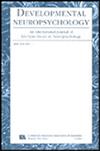迈向包容性的社会认知评估:验证一个统一的听力和聋哑儿童电池。
IF 2.2
4区 心理学
Q3 PSYCHOLOGY
Developmental Neuropsychology
Pub Date : 2025-01-01
Epub Date: 2025-07-01
DOI:10.1080/87565641.2025.2521528
引用次数: 0
摘要
社会认知电池(SCB)被证明是一种评估听力和聋哑儿童社会认知(SC)的包容性工具,可以解决跨文化差距。参与者包括来自拉丁美洲的154名听力正常的儿童(M年龄= 8.10,SD = 1.56)和30名失聪儿童(M年龄= 9.80,SD = 1.97)。探索性因子分析显示单因子SC结构(RMSEA = 0.069, CFI = 0.962)具有高信度(ω = 0.753)。年龄能预测正常儿童的SC,而学年能更好地解释失聪儿童的SC。ROC分析(AUC = 0.8126)证实有较强的判别能力。SCB是一个可靠的、适应不同文化的工具,适用于不同的人群。本文章由计算机程序翻译,如有差异,请以英文原文为准。
Toward Inclusive Social Cognition Assessment: Validating a Unified Battery for Hearing and Deaf Children.
The Social Cognition Battery (SCB) was validated as an inclusive tool for assessing social cognition (SC) in hearing and deaf children, addressing cross-cultural gaps. Participants included 154 hearing (M age = 8.10, SD = 1.56) and 30 deaf children (M age = 9.80, SD = 1.97) from Latin America. Exploratory Factor Analysis revealed a unifactorial SC structure (RMSEA = 0.069, CFI = 0.962) with high reliability (ω = 0.753). Age predicted SC in hearing children, while school year better explained SC in deaf children. ROC analysis (AUC = 0.8126) confirmed strong discriminative ability. The SCB is a reliable, culturally adapted tool for diverse populations.
求助全文
通过发布文献求助,成功后即可免费获取论文全文。
去求助
来源期刊
CiteScore
2.80
自引率
6.70%
发文量
17
审稿时长
>12 weeks
期刊介绍:
Devoted to exploring relationships between brain and behavior across the life span, Developmental Neuropsychology publishes scholarly papers on the appearance and development of behavioral functions, such as language, perception, and social, motivational and cognitive processes as they relate to brain functions and structures. Appropriate subjects include studies of changes in cognitive function—brain structure relationships across a time period, early cognitive behaviors in normal and brain-damaged children, plasticity and recovery of function after early brain damage, the development of complex cognitive and motor skills, and specific and nonspecific disturbances, such as learning disabilities, mental retardation, schizophrenia, stuttering, and developmental aphasia. In the gerontologic areas, relevant subjects include neuropsychological analyses of normal age-related changes in brain and behavioral functions, such as sensory, motor, cognitive, and adaptive abilities; studies of age-related diseases of the nervous system; and recovery of function in later life.
Empirical studies, research reviews, case reports, critical commentaries, and book reviews are featured in each issue. By publishing both basic and clinical studies of the developing and aging brain, the journal encourages additional scholarly work that advances understanding of the field of lifespan developmental neuropsychology.

 求助内容:
求助内容: 应助结果提醒方式:
应助结果提醒方式:


